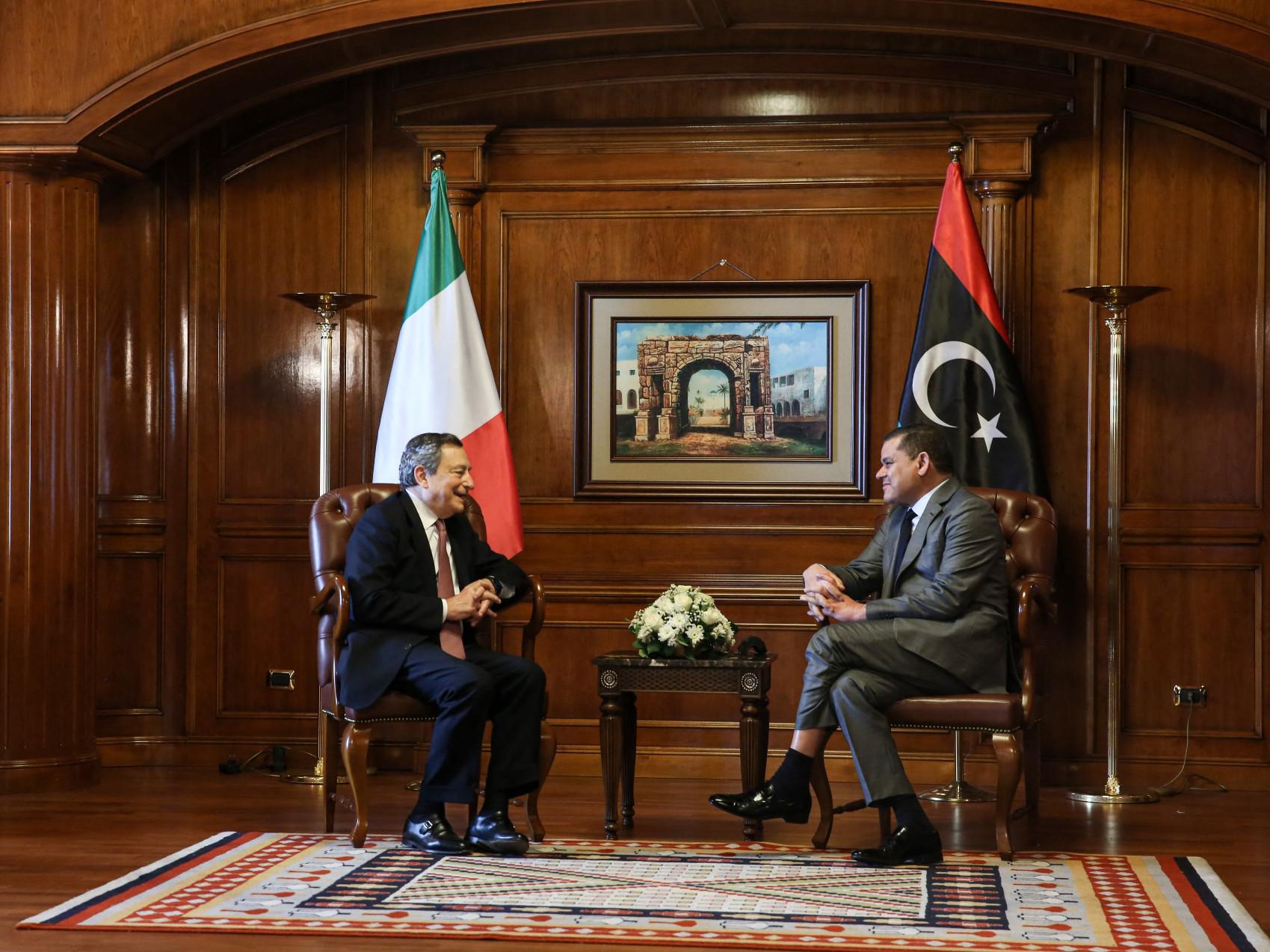In his first trip abroad as Italian PM Draghi set out Italy’s plans to develop Libya’s stability, ties with Europe, infrastructures, and more. The event chronicles Rome’s increasing status as a Mediterranean centre of gravity
On Tuesday the Italian PM Maio Draghi flew to Tripoli to meet with his Libyan counterpart, Abdulhamid Dabaiba. It was his very first trip abroad as PM, as well as the first visit of a Western head of state to the newly established Libyan National Unity Government (NUG), although it was shortly followed by that of the Greek PM Kyriakos Mītsotakīs.
The visit “demonstrated the importance of the historical ties between the two countries […] this moment is unique to rebuild an ancient friendship and a vicinity which has never known interruptions,” said Mr Draghi after the meeting, before remarking that the Italian embassy was the only one to remain open throughout all the years of the Libyan civil war.
The Italian PM’s trip embodied Italy’s (and, by extension, Europe’s) support for the Libyan reconstruction process, to be carried out according to the path laid out by the UN – the actual cradle of the dialogues that brought Mr Dabaiba’s government to life. The US supports this process, too, although it seems willing to rely on its European partners to mind the matters concerning the Mediterranean while it focusses on the Far East.
Italy is a natural candidate for the Atlanticist projection in Libya and Northern Africa, due to its geographical position and its historical ties to the continent. The Italian foreign minister’s visit to Tripoli just ahead of his encounter with US Secretary of State Antony Blinken suggests that the US sees things this way, too. By engaging directly with Mr Dabaiba and setting out Rome’s plans to make a difference in Libya, Mr Draghi took things up a notch.
In his post-meeting speech, he highlighted the preconditions for success in Libya’s peace process, including the upholding of the ceasefire and free and fair elections in December. Peacekeeping and regional stability efforts will also depend on the activity of foreign forces, such as Russian and Turkish military, and their eventual withdrawal.
Indeed, Libyan stability (or lack thereof) has knock-on effects on the rest of the complex hub of interlinked interests that is the Med (and neighbouring regions, such as the Sahel). One such example is the contested drilling spots in the East Med, where Ankara and Athens nearly clashed – and where Rome and Paris have significant energy interests.
Another key matter is the African emigration flux, which – as Mr Draghi pointed out – begins beyond Libya’s Southern border and then seeps into Europe via Italy through the countries’ coastlines. The Italian PM praised the Libyan efforts to save lives at sea and reminded that Italy was perhaps the only country to keep humanitarian channels open, calling for a Europe-wide approach to the matter.
But Italy’s errands in Libya do not stop there, as Rome is effectively acting as a strategic partner to Tripoli on dossiers which are crucial to its recovery. In fact, Mr Dabaiba called for Italian companies and investors to “consider Libya their home, not just an investment partner,” as he told the Italian daily Corriere della Sera.
In his post-meeting remarks, Mr Dabaiba also signalled Libya’s willingness reopen customs and airports and to restore the country’s links to Europe. Mr Draghi upheld those efforts, mentioning the so-called Highway of Peace, to be built along Libya’s coast with Italy’s aid – a project first envisioned in the Treaty on Friendship, Partnership and Cooperation between Italy and Libya, signed in 2008 between Silvio Berlusconi and Muammar Gaddafi – as a building block of practical collaboration.
“If we want to take advantage of the historical relations between the two countries we cannot but start from the 2008 Treaty,” argued Francesco Paolo Trupiano, Italy’s last ambassador to Gaddafi’s Libya, on Formiche.net. He also noted that the time seems ripe to reopen Italy’s consulate in Benghazi, which was set ablaze in 2006 causing eleven Libyan deaths, so as to amplify Rome’s efforts in the Eastern part of the country.
The wheels are already in motion. When foreign minister Luigi Di Maio flew to Libya he was accompanied by Claudio Descalzi, managing director of the Italian energy company Eni, which has already committed to help with the reopening of oil fields, the intermittent electricity blackouts that still plague the national grid and the energetic industry reconversion towards more sustainable energy sources. And right before Mr Draghi’s visit, a delegation from ENAV – Italy’s national air navigation service provider – made its way to Tripoli.
Mr Draghi’s assertiveness in supporting the Libyan peace process seems designed to broadcast Italy’s status as a recovering – yet trustworthy – power broker in the Med, one that works closely with the rest of the EU and the US and takes advantage of its historical ties to Libya to expedite the recovery process.








